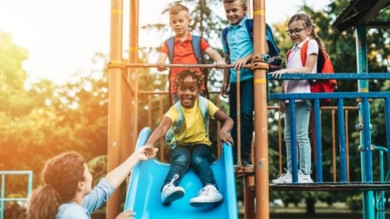
For most people, a park is a getaway from reality. For others, it’s the perfect place to run around, exercise, and have a relaxing picnic in the park. We have an entire list of reasons that parks continue to prove they help with mental health, including reducing symptoms of depression and anxiety. Here’s our guide on how a playground might help fight depression.
Reduced Stress
If you’ve noticed community members feeling drained, there’s a chance that they need a break from their everyday lives. Likewise, families—especially those with children—often feel overwhelmed when they have too much going on at one time.
When families are in nature, they experience lower levels of stress and feel more creative. Also, compared to those in areas that don’t have access to parks or playgrounds, families have a more positive experience with their mental health after spending time outside.
Depression Goes Down
With the rise of the digital world, we see more children bored and depressed because they feel insecure after seeing something on social media or lacking social skills in the real world. However, many studies show that parks with more natural surroundings help decrease depression in community members.
For example, urban areas have fewer green areas due to the influx of high-rise buildings taking over cities. With fewer parks or natural areas to play in, many experience depression. Those in other towns or rural areas with abundant outdoor space are less likely to experience depression since there’s better access to natural areas.
Focus Increases
Many children have a difficult time focusing and learning when they’re stuck inside all day. To increase focus and promote a positive outlook on learning, kids need room to move around, explore, and engage in hands-on learning. Taking your child to the park or playground helps them learn how to alleviate stress in a better way.
Children who spend time outside tend to be more active, have improved mental health, and have better focus.
Encouraged Social Interaction
When outside, children have a chance to test their boundaries and learn how to be social with others. While playing sports or swinging, kids learn about interpersonal skills, such as patience, teamwork, and motivation.
As children learn more about the world around them, they develop a more positive understanding of the world and learn how to interact with others.
Happiness Increases
Another sign of how a playground might help fight depression is that playing on a playground can increase happiness. We all need a positive way to let go of stress and develop our mental health further, and we can do that at the park. Parks are a great way to let go of stress and fight depression, especially when commercial children’s play equipment is readily available.
A positive way to improve mental health starts in the neighborhood park. We highly recommend that park administrators purchase playground equipment to help bring residents together and promote better mental health. Discount Playground Supply provides many ways for communities to improve their parks to fight depression and better impact children’s development.

